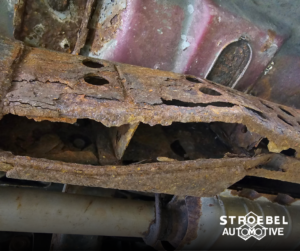Rust, the notorious enemy of metal, can turn a sturdy vehicle frame into a safety hazard. Vehicle frames are the backbone of a car’s structure, providing support and integrity. When rust starts to invade, it compromises this essential foundation.
Causes of Frame Rust
Rust forms when iron or steel reacts with oxygen and moisture, leading to corrosion. Several factors contribute to the rusting of a vehicle’s frame:
- Environmental Exposure: Vehicles in regions with harsh winters, where roads are salted to prevent ice, are particularly susceptible. Salt accelerates the rusting process by lowering the metal’s resistance to corrosion.
- Age and Wear: Older vehicles are more likely to develop rust, especially if they haven’t been appropriately maintained. Over time, paint and protective coatings wear off, exposing the metal underneath.
- Driving Conditions: Frequent driving on dirt or gravel roads can chip away protective coatings, making the frame more vulnerable to rust.
- Neglect: Lack of regular maintenance and inspections can allow rust to go unnoticed until it has caused significant damage.
Risks of a Rusted Frame
A rusted frame is more than just a cosmetic issue; it poses serious safety risks:
- Structural Integrity: The frame supports the entire vehicle. When rust eats away at this critical component, it weakens the vehicle’s overall structure, making it unsafe to drive.
- Safety Hazards: Rust can cause parts like control arms, suspension mounts, and even the engine cradle to fail, leading to catastrophic failures while driving.
- Repair Costs: Extensive rust can lead to costly repairs. In severe cases, it can even result in the vehicle being deemed a total loss because the cost to fix the rust damage outweighs its value.
Addressing Rust Damage
If you discover rust on your vehicle’s frame, it’s crucial to act quickly:
- Inspection: Have a professional thoroughly inspect the frame to assess the extent of the damage. Surface rust can often be sanded off, but structural rust requires more intensive repairs.
- Repair or Replace: Minor rust can be treated and painted to prevent further corrosion. For more severe rust, parts of the frame may need to be cut out and replaced or reinforced with welding. In some cases, the entire frame might need replacement, which is an expensive and complex process.
- Professional Help: Consult with a skilled welder or a body shop experienced in dealing with rust. They can provide options tailored to the severity of your frame’s condition.
Preventing Frame Rust
Preventing rust from forming in the first place is the best way to protect your vehicle:
- Regular Cleaning: Wash your vehicle regularly, especially the undercarriage, to remove salt and grime that can promote rust.
- Protective Coatings: Applying rust-proofing treatments and protective coatings can significantly extend the life of your frame.
- Routine Inspections: Regularly inspect your vehicle for signs of rust, particularly in areas prone to corrosion.
- Garaging: Keep your vehicle in a garage to protect it from the elements.
Rust is a formidable foe, but with vigilant care and timely intervention, you can prevent it from compromising your vehicle’s safety and longevity. By understanding the causes and addressing rust promptly, you ensure your vehicle remains a reliable companion on the road. Stroebel Automotive believes that rust repair of a frame or structural portion of a unibody vehicle is an excessive safety risk that we cannot assume. Complete frame replacement on a full-frame vehicle is a safe option. Contact Stroebel Automotive for your regular maintenance today!


